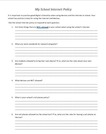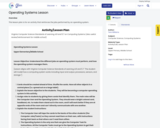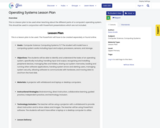
In this lesson, students will use the iterative design process to construct a story map for a fictional short story.
- Subject:
- Computer Science
- English
- Material Type:
- Activity/Lab
- Author:
- Andrea Lee
- Date Added:
- 10/10/2023


In this lesson, students will use the iterative design process to construct a story map for a fictional short story.

This lesson is part of the Virginia K-12 Computer Science Pipeline which is partly funded through a GO Virginia grant in partnership with Chesapeake Public Schools, Loudoun County Public Schools, and the Loudoun Education Foundation. During this lesson, students will create a storyboard and pseudocode which will be used while creating a simulation using Scratch.

Students use the school internet policy to answer questions about the school's rules and guidelines for internet and device use.

Video Description: In this close-up video, Dr. Catherine Nakalembe, Remote Sensing Scientist for NASA Harvest, shares her passion for helping farmers around the world through the use of NASA satellites to monitor crops from space to increase sustainability. She also describes how her love for hiking, photography, and travel supports her work. Video Length: 2:09.NASA eClipsTM is a suite of online student-centered, standards-based resources that support instruction by increasing STEM literacy in formal and nonformal settings. These free digital and downloadable resources inform and engage students through NASA-inspired, real-world connections.NASA eClips Ask SME: Close-up with a NASA Subject Matter Expert videos are professionally developed to capture a glimpse of NASA SME's personal interests and career journeys. Each can be used to spark student interest and broaden their ideas of the STEM workforce. Additional videos in this series can be found by searching GoOpenVA using "NASA eClips Ask SME".

Use the Google Jamboard to compare and contrast features of Local Access Networks and Wide Area Networks.

This slideshow introduces students to binary, what it represents and how computers see and use it.

In this exciting and interactive experiment, students will have the opportunity to discover and understand the relationship between force and mass regarding the movement of various-sized balls. Through the use of Spheros, these ingenious devices will enable students to apply force to balls of different sizes, including the wiffle ball, racquetball, softball, and ping pong ball. By observing the fascinating dynamics at play, students will gain invaluable insights into how force and mass influence the trajectory, speed, and overall movement of these balls. This hands-on activity is sure to spark curiosity and foster a deeper appreciation for the principles of physics in a fun and engaging manner.

This lesson plan is for an activity that reinforces the jobs performed by an operating system.

This is a lesson plan to be used when teaching about the different parts of a computer's operating system. This should be used in conjunction with PowerPoint presentations which are not included.

This lesson is designed to be a fun and interactive way to help reinforce comparing and ordering numbers. It is a great unplugged way to show how we solve problems by constructing algorithms to include loops, variables, and conditionals. This lesson also leaves the door wide open to use that same sorting network with other types of sorting or ordering activities. The sorting network template will grab the students' attention, and the repetition and practice will reinforce the skills. Because this is a large group activity, it is easy to offer extra support to learners who need extra help. Because the teacher is choosing the fractions for input each time, she has control over how easy or difficult the tasks are made. I’m excited to try out this lesson!

Scientific Method and scientific investigation are skills needed for our students to explore new adventures and avenues. Kids will have a good time exploring science while dissolving marshmallows. Students will be investigating how temperature affects the size of a marshmallow. The students will determine the constant, dependent variable, and independent variable.

Using this kit, students really learn and do the energy conversions. They physically have the pieces in their hands to create each conversion and then some. The worksheet keeps them focused on what they have to do instead of just playing with the kits. But this isn’t to discredit that they wouldn’t learn by just playing with the kits. Conversion of energy is hard to grasp in theory, why not make it physical and help them remember.

Students will explore kinetic, potential, energy, speed, force, motion, light, and wind energy. Students will be able to understand that energy can be converted into different forms. Student will learn to make predictions, record, analyze, and make conclusions about data.

Students will use Spheros to explore the force and energy of moving objects. This lesson is appropriate for students and teachers with little to no experience with coding. Students will evaluate a single line of programming that directs the Sphero to move and test to see if they correctly anticipated the results. Students will bowl down "pins" by programming the Sphero. Students will experiment with changing variables and discuss how that changes the motion.

Students will be exploring energy and motion using ramps and balls.

Celebrate Earth Day with this lesson full of activities to show your students why we need to take care of our environment.

This is a review lesson intended to be used at the end of the unit on Oceans. Students work in teams to complete activities that will result in the creation of a code or password. The codes will open a series of four locks to open a large lock box. A smaller lock box with a more difficult password can be solved to reveal a prize. This lesson also incorporates the topic of cybersecurity using password safety.

Sequencing the Scientific method Students struggling with currently sequencing the scientific method? This activity will help students understand how and why it is important to currently order the scientific method by having them incorrectly carry out the method in an experiment! Yes!!! You read correctly students will attempt to conduct and experiment using the Scientific method out of order to begin with! They will journal the results and discuss with their small group, why this order did not work and how to fix the sequence. Then they will conduct the same experience using the correct sequence of the scientific method using the Scientific Experiment recording sheet. Once they have successfully conducted the experiment, students will discuss and journal their results comparing both experiments.

Learn about the thrill of force and motion with a Sphero Bolt Race, obstacle course, and ramps.

This hands-on science experiment allows students to observe the effects of different amounts of sunlight in plant growth.